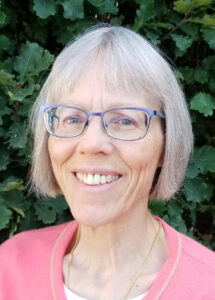“Lent has a way of finding me,” a woman who leads Adult Catholic Initiation in her parish told me at the start of this Lenten season. I continue to reflect on how that statement applies to my own experience of Lent this year.
A week or so before Lent, a staffer in the chancery kitchen recommended a movie to me, “The Way.” The 2011 drama tells the story of a grieving father (Martin Sheen) who decides, impulsively, to make the nearly 500-mile pilgrimage from France to Spain’s Santiago de Compostela. He undertakes the arduous journey in an effort to understand better himself and his adult son who died attempting the pilgrimage.

My husband Steve and I watched the movie and found it compelling, even though Martin Sheen’s character took action that goes against Catholic teaching, most especially regarding the disposition of cremains. All of the characters are flawed, broken human beings who need to accept one another and hold one another accountable for actions that harm others or themselves.
Theirs was not a Lenten journey per se, but it could have been, based on the storyline. Like all of us on the Lenten journey, the drama’s protagonists were searching for transformation, whether or not they acknowledged it. Lent found them, and the experience changed if not transformed them.
Lent found me in the third week of the season as I struggled with a nasty head cold that left me lethargic and sapped my energy reserves. Getting through the workweek, let alone focusing on the three Lenten pillars of prayer, fasting and almsgiving, seemed daunting. At mid-week, my parish (Our Lady of the River in LeClaire) offered a Lenten communal reconciliation service that I thought about skipping. That quiet whisper from God convinced me to don a KN95 mask and attend the liturgy. It proved to be a blessing.
During the Rite of Reconciliation, our pastor, Father Mpanda Apo and two readers led us through an examination of conscience that riveted my attention. “Too much attention to our own victories and failures can make us self-absorbed and confirm us in the illusion that we manage our own lives,” Father Apo said. “Examination is rather a question of asking how I respond to God’s loving action in my life.”
Eight points of examination of conscience followed, among them:
• How was I drawn to God today: a friend, an event, a book, the beauty of nature? Have I learned anything about God and his ways, in ordinary occasions, spare moments?
• Did I meet him in: fears, joys, work, misunderstandings, weariness, suffering? Did his word come alive in prayer, Scriptures, liturgy?
• Did I bring Christ to my community? Did they bring Christ to me? Have I been a sign of God’s presence and love to the people I met today?
• Did I go out to the lonely, the sorrowful, the discouraged, the needy? Was I aware of God’s work in my own locality, my country, in other nations of the world, in the Church at large?
What a loving, practical approach to an examination of conscience, I thought to myself, while at the same time acknowledging the areas in which I have fallen short and will still strive to do better. Clearly, God wanted me to hear, read and reflect on these questions and to act on them.
Our liturgy that evening concluded with an act of repentance, recitation of the Lord’s Prayer and a final prayer leading us into individual confession.
Lent found me, helping me to appreciate that any struggles I experience this season are minuscule when compared with the suffering of the people of Ukraine and anyone enduring deprivation of any kind. Like the protagonists on the pilgrimage to Santiago de Compostela, my Lenten pilgrimage can be transforming, if I allow it to be.
(Contact Editor Barb Arland-Fye at arland-fye@davenportdiocese.org)











